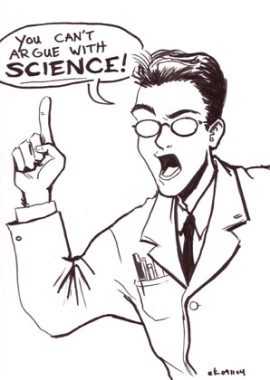Some recent conversations I’ve had got me thinking about the role of research again. How do you know if what you are being told about a fitness program is sound? Is scientific evidence the only valid measure? What evidence should you listen to?
I tell people all the time that they need to focus on moving better, strengthening their bodies, and developing sensible eating habits. How do I know any of that is true? For me there are three pillars that form the foundation for my philosophy on this question, which are:
1 – Scientific evidence
2 – Practical Experience
3 – I don’t really know anything
Scientific Evidence
Scientific evidence should be a pillar of any expert’s advice, but I would also say it should not be exclusionary. Let me explain with a small anecdote. A client of mine has recently decided to try gyrotonics because a physicians assistant told her it would be good to combat osteopenia (early bone density loss). I have been recommending strength training as an effective method for slowing bone density loss. Which one is right, or are they both right? I did a search of pub-med for studies on the subject and found quite a few meta-analyses involving strength training, all of which seem to indicate that strength training is probably a good bet. I searched for gyrotonics and bone density and found nothing. In fact, I didn’t find studies of any kind on gyrotonics.
Now, just because there are not any studies does not mean that gyrotonics is not a good way to fight osteopenia. A lack of evidence doesn’t prove anything. But it does raise a very important question which is, what is this physician’s assitant basing this recommendation on? If not on any scientific evidence, then it must be something else, and I would want to know what it is if I were considering taking the advice. Which brings us to pillar number 2.
Practical Experience
Experience goes a long way. Sometimes I think it is easy to get the impression that experts always base everything on objectively measurable facts, which is simply not the case. It is also not necessary. A lot of caring for another person is having a lot of experience with the situation and developing an instinct for what is most likely to be effective with the particular person in front of you. I’ve done quite a few training sessions at this point with quite a few people. I know a bit about what things are supported by evidence and how they fit into what I do with a client, but I also know that every client is different. There is a certain amount of flexibility that I need to have, whether or not a study has been done proving that my next move should be x, y, or z.
I Don’t Really Know Anything
Let’s be real for a second. I’m not a scientist and I haven’t conducted any studies. So all I can really do is trust third party sources. My best defense against this reality is to look at a lot of different sources and search for consensus – and that’s where all these studies come in (particularly meta-analyses). The more you read things, look at studies, and try them out, the more of a feel you can get for what is good and what is not. But at the end of the day, short of running the experiments ourselves, we pretty much have to trust third party sources. So again, it’s about finding a good balance and, if someone ever asks what you are basing an opinion on, having an actual answer.
The Sort-of Bottom Line
What I have discovered, trying to do my best at using science and expert advice to guide me, is that we all need to be more open to experimentation. Studies show a lot of things, practical experience shows a lot of things, and some stuff defies explanation altogether. I’ve even heard arguments that everything in modern medicine comes down to the placebo affect. (I think that position is probably a little extreme). Sometimes, we don’t have to have THE answer, sometimes we just need to start somewhere.
RELATED
Diet Science: Don’t Get Buried
PHOTO – Erin Stevenson O’Connor, You Can’t Argue With Science, License
